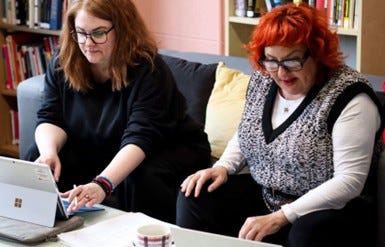Working-class storytelling: our personal lives have always been political
Academic and Battle of Ideas speaker Lisa Mckenzie on how she accidentally became a playwright, reflecting on her youthful experiences and her community during the miners' strike in Nottinghamshire.
Lisa Mckenzie has been a frequent speaker at the Battle of Ideas festival in recent years and she’ll be back this year, too. The festival takes place at Church House in Westminster on the weekend of 18 & 19 October. Early-bird tickets are still available for another week or so, and are available from the Battle of Ideas website.
Every so often, life delivers a surprise so unexpected it takes you back to your seven-year-old self. For me, that was scribbling ambitions inside a second-hand book on wildflowers, not realising I was laying the groundwork for something much bigger. This is how I feel about theatre, and the play I have co-written, sixTeen. It’s being rehearsed as I write, ready to be unveiled to the world in September – or in Ashfield, Nottinghamshire to begin with…
One year. One estate. Where childhood meets reality…
Set in Sutton-in-Ashfield, 1984, while the miners’ strike is raging, sixTeen contains stories that have been well-told and well-rehearsed over generations. But this isn’t a story you’ve heard before. This is Carsic Estate and a girl's-eye view of a world built by industry, broken by policy, and handed down without a map. It is a re-telling of those old stories you may have once heard in living rooms and in the factory, in working-men’s clubs and down the pub, but now retold against the backdrop of our own hyper and tumultuous political age.
My journey into theatre wasn’t plotted in advance; it was a detour, an unexpected opportunity that arrived after a chance meeting with Jayne Williams from New Perspectives Theatre. Jayne isn’t just a playwright; she’s a participation director with roots deep in the mining towns of Nottinghamshire. Like me, she grew up among the strikers and storytellers. Our fathers both worked at Silverhill Pit in Sutton-in-Ashfield, our families were both striking families in the 1984 miners’ strike.
I didn’t see myself as a theatre person. To be honest, theatre felt like a world apart – a place for the middle class and not somewhere that had ever entered the council estate world. Definitely not a place where the stories told in living rooms, and in the Miners Welfare would come from. But as Jayne and I talked – cautiously, at first – we recognised each other’s memories, each other’s communities.
From the factory floor
The play is set in 1984, just as my dad, a Nottinghamshire miner, goes on strike and I start work. My first job after leaving school, and where I stayed for 11 years, was clocking in at Pretty Polly to make tights, side-by-side with my mum, aunties and cousins. The storytelling never stopped – if anything, it grew louder, more communal, more theatrical. When the strike hit in 1984, my life was swept up in it. My mum threw herself into organising the Ashfield Women Against Pit Closures campaign. That year, we wrote hundreds of letters asking for solidarity – letters written by hand, sprawled across the living-room floor, leaning on the Freemans catalogue. We told stories of hope, anger and resilience.
The strike wasn’t just political; it was deeply personal. My mum collected memorabilia, letters and photos, beer mats with addresses, thank you notes from solidarity campaigns. In one pile of photos, I even found one of Jayne’s parents with mine, standing together in the strike centre.
Theatre, for me, became a way to perform memory, about the right to tell stories that matter, stories that have been overlooked, dismissed or caricatured by the mainstream. Jayne and I realised that the working-class families of Ashfield deserved to see their stories on stage – not as tragedy, not as social commentary from above, but as living, breathing, joyful, angry, complicated reality.
Writing sixTeen was an act of reckoning with our own histories. Could I write a story for others to tell? I come from a long line of working-class storytellers, people who could hold a room, hold a pub, who could turn hardship into laughter, pain into solidarity.
But writing for theatre meant learning a new language, a new form. It meant letting go of the idea that my stories were too small, too specific, too local. Working-class theatre is about reclaiming those stories, about recognising that the lives we live – the struggles, the celebrations, the everyday acts of resistance – are worth putting on stage. It’s about challenging the assumption that only certain voices, only certain lives, are worthy of attention.
When working-class theatre is done right, it isn’t charity or tokenism. It’s advocacy – an act of solidarity, a refusal to let our lives be erased or simplified. It draws people in, invites them to see themselves on stage and to realise that their experiences matter.
If you want to know why working-class theatre matters, come and listen. Better yet, come and tell your own story.
The story we’ve told is stripped bare to the language and rhythm of our culture. It chimes with factories and the coal mines of our own personal histories. The cadence and accent is that of the working-class women that have left us, but whose voices we can still hear. We’ve written our own love letter to our home town.
Dr Lisa McKenzie is senior lecturer in Sociology at the University of Bedfordshire. She is co-author of sixTeen with Jayne Williams. Find out more about the play here. Lisa will be speaking in the Battle of Ideas festival debate From PIPs to Motability: who can reform welfare? on Sunday 19 October.





